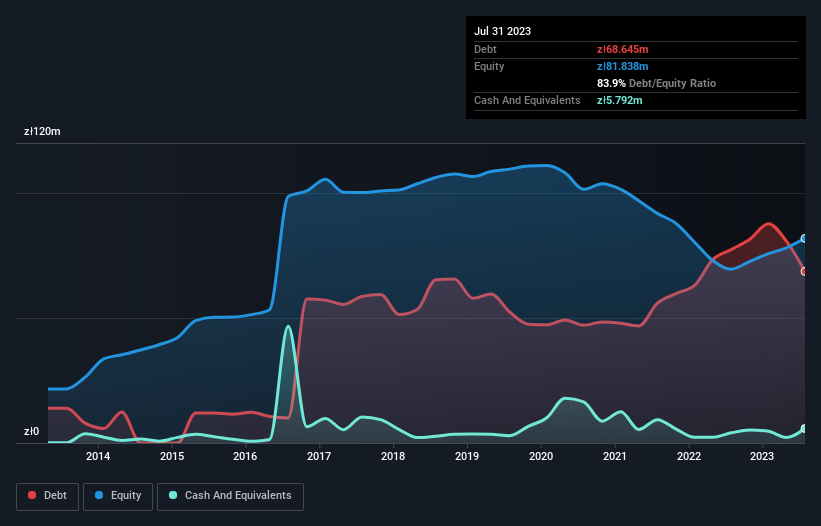Legendary fund manager Li Lu (who Charlie Munger backed) once said, 'The biggest investment risk is not the volatility of prices, but whether you will suffer a permanent loss of capital.' So it seems the smart money knows that debt - which is usually involved in bankruptcies - is a very important factor, when you assess how risky a company is. As with many other companies IZOBLOK S.A. (WSE:IZB) makes use of debt. But is this debt a concern to shareholders?
When Is Debt A Problem?
Debt assists a business until the business has trouble paying it off, either with new capital or with free cash flow. Ultimately, if the company can't fulfill its legal obligations to repay debt, shareholders could walk away with nothing. However, a more common (but still painful) scenario is that it has to raise new equity capital at a low price, thus permanently diluting shareholders. Having said that, the most common situation is where a company manages its debt reasonably well - and to its own advantage. When we think about a company's use of debt, we first look at cash and debt together.
View our latest analysis for IZOBLOK
What Is IZOBLOK's Net Debt?
You can click the graphic below for the historical numbers, but it shows that IZOBLOK had zł68.6m of debt in July 2023, down from zł77.4m, one year before. However, it also had zł5.79m in cash, and so its net debt is zł62.9m.

How Strong Is IZOBLOK's Balance Sheet?
The latest balance sheet data shows that IZOBLOK had liabilities of zł75.8m due within a year, and liabilities of zł43.2m falling due after that. On the other hand, it had cash of zł5.79m and zł41.7m worth of receivables due within a year. So its liabilities outweigh the sum of its cash and (near-term) receivables by zł71.5m.
Given this deficit is actually higher than the company's market capitalization of zł56.5m, we think shareholders really should watch IZOBLOK's debt levels, like a parent watching their child ride a bike for the first time. Hypothetically, extremely heavy dilution would be required if the company were forced to pay down its liabilities by raising capital at the current share price.
We measure a company's debt load relative to its earnings power by looking at its net debt divided by its earnings before interest, tax, depreciation, and amortization (EBITDA) and by calculating how easily its earnings before interest and tax (EBIT) cover its interest expense (interest cover). The advantage of this approach is that we take into account both the absolute quantum of debt (with net debt to EBITDA) and the actual interest expenses associated with that debt (with its interest cover ratio).
IZOBLOK's net debt of 2.4 times EBITDA suggests graceful use of debt. And the fact that its trailing twelve months of EBIT was 7.7 times its interest expenses harmonizes with that theme. Notably, IZOBLOK made a loss at the EBIT level, last year, but improved that to positive EBIT of zł17m in the last twelve months. There's no doubt that we learn most about debt from the balance sheet. But you can't view debt in total isolation; since IZOBLOK will need earnings to service that debt. So when considering debt, it's definitely worth looking at the earnings trend. Click here for an interactive snapshot.
Finally, while the tax-man may adore accounting profits, lenders only accept cold hard cash. So it is important to check how much of its earnings before interest and tax (EBIT) converts to actual free cash flow. Looking at the most recent year, IZOBLOK recorded free cash flow of 34% of its EBIT, which is weaker than we'd expect. That weak cash conversion makes it more difficult to handle indebtedness.
Our View
We'd go so far as to say IZOBLOK's level of total liabilities was disappointing. But on the bright side, its interest cover is a good sign, and makes us more optimistic. Overall, we think it's fair to say that IZOBLOK has enough debt that there are some real risks around the balance sheet. If everything goes well that may pay off but the downside of this debt is a greater risk of permanent losses. When analysing debt levels, the balance sheet is the obvious place to start. But ultimately, every company can contain risks that exist outside of the balance sheet. For example IZOBLOK has 4 warning signs (and 1 which shouldn't be ignored) we think you should know about.
If, after all that, you're more interested in a fast growing company with a rock-solid balance sheet, then check out our list of net cash growth stocks without delay.
New: AI Stock Screener & Alerts
Our new AI Stock Screener scans the market every day to uncover opportunities.
• Dividend Powerhouses (3%+ Yield)
• Undervalued Small Caps with Insider Buying
• High growth Tech and AI Companies
Or build your own from over 50 metrics.
Have feedback on this article? Concerned about the content? Get in touch with us directly. Alternatively, email editorial-team (at) simplywallst.com.
This article by Simply Wall St is general in nature. We provide commentary based on historical data and analyst forecasts only using an unbiased methodology and our articles are not intended to be financial advice. It does not constitute a recommendation to buy or sell any stock, and does not take account of your objectives, or your financial situation. We aim to bring you long-term focused analysis driven by fundamental data. Note that our analysis may not factor in the latest price-sensitive company announcements or qualitative material. Simply Wall St has no position in any stocks mentioned.
About WSE:IZB
IZOBLOK
Provides expanded polypropylene (EPP) components to the automotive industry worldwide.
Slightly overvalued with imperfect balance sheet.
Market Insights
Community Narratives



